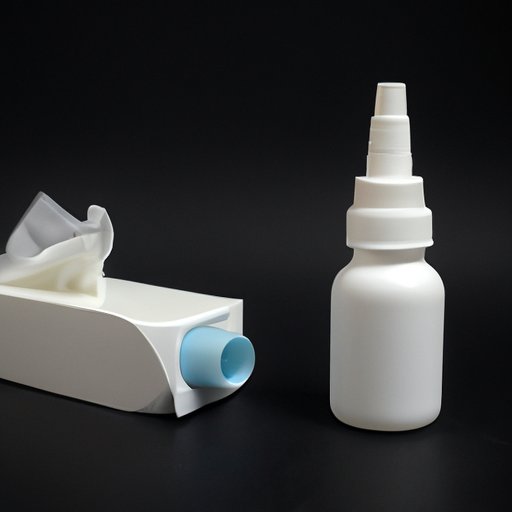
Introduction
Flonase is a popular nasal spray used to relieve symptoms of nasal allergies. It contains fluticasone propionate, a corticosteroid that prevents the release of inflammatory agents released during an allergic reaction. While Flonase is safe and effective, concerns have been raised about its usage frequency, leading to questions of how often it can be taken. In this article, we will explore the safe and effective ways to take Flonase and discuss the risks of overusing it.
“Is it Safe to Use Flonase Every Day?”
Flonase is available over-the-counter, and as such, no prescription is required. It is used to treat nasal symptoms of allergies, such as sneezing, congestion, and runny nose. The recommended dosage is two sprays in each nostril once a day, but some individuals may require a higher dosage as per their healthcare provider’s recommendation.
The risks of overusing Flonase are present, as with any medication. Corticosteroids may lead to thinning of the nasal lining or bleeding if overused. Additionally, in rare cases, overexposure to steroids may result in an adrenal crisis. It is crucial to follow the recommended dosages, as Flonase’s prolonged usage may also lead to decreased bone density and an increased risk of cataracts.
It is safe to use Flonase every day, and long-term usage is also safe, provided dosages are followed.
“Maximizing Your Flonase Use: The Dos and Don’ts”
Flonase is most effective when used correctly, ensuring that the medicine reaches its target destination. Begin by gently blowing your nose to clear the nasal passage, ensuring the spray can reach the lining. Tilt your head down and insert the spray nozzle into the nostril, pointing towards your ear. Cover the opposite nostril and press down on the spray nozzle. Repeat with the other nostril. Do not sniff while spraying.
Common mistakes to avoid while using Flonase include failing to prime the spray before first use, allowing the nozzle to become clogged with mucus, and spraying too hard, which may lead to inhaling the medication into the lungs.
“Alternatives to Flonase for Nasal Allergies”
While Flonase is a popular option for nasal allergies, several alternatives cater to different needs. Antihistamines such as Claritin, Benadryl, and Zyrtec may provide relief for itchy, watery eyes and a runny nose. Decongestants such as Sudafed may alleviate nasal congestion, but it comes with a risk of overuse and potential side effects such as restlessness and insomnia. Steroid nasal sprays such as Nasonex and Nasacort are similar to Flonase and may be used interchangeably. However, certain medications may not work for everyone, emphasizing seeking advice from a healthcare professional.
“Flonase vs. Other Steroid Nasal Sprays: Which Is Best for You?”
Flonase and other steroid nasal sprays such as Nasonex and Rhinocort are similar in composition. However, some differences make Flonase stand out. Flonase acts quicker than other sprays, with results showing in as little as 12 hours after the first dose. Flonase also has an added advantage of being available over the counter, allowing for self-diagnosis and medication. However, some individuals may benefit from other steroid nasal sprays upon the recommendation of their healthcare provider.
“Effects of Overusing Flonase on Your Body”
While overuse of Flonase may improve allergy symptoms, it also has specific harmful effects on the body. Overuse may cause dependence on the medication, leading to symptoms of withdrawal when stopped. Additionally, prolonged use may lead to oxygen absorption difficulties, preventing the body from controlling its carbon dioxide levels. Long-term steroid exposure may also compromise the immune system, leading to an increased risk of contracting illnesses.
“How to Wean Off Flonase Safely”
Shortly after stopping Flonase use, it is normal to experience nasal congestion and other allergy symptoms. This reaction is known as rebounding, and it may last for a couple of days. To safely discontinue Flonase use, begin by cutting down on the dosage, dedicating time to monitoring your body’s reactions. Individuals utilizing Flonase frequently or for a long time may experience withdrawal symptoms when stopping abruptly. It is advisable to wean off Flonase with the guidance of a healthcare professional.
“Consulting a Doctor Before Taking Flonase Long-term”
While Flonase is available over-the-counter and is safe for prolonged use, it is essential to discuss extended use with a healthcare professional. A healthcare professional will assess the individual’s medical history and existing conditions to determine whether individuals have any contraindications or potential side effects. The practitioner may also develop an individualized treatment plan to manage individuals’ allergy symptoms.
Conclusion
Flonase is a safe and effective nasal spray widely used to alleviate allergy symptoms. It is essential to follow the recommended dosages and avoid overuse to prevent potential harmful side effects. Several alternatives to Flonase, such as antihistamines and steroid nasal sprays, cater to different needs. Weaning off Flonase use requires patience and dedication, and it is advisable to seek the guidance of a healthcare professional. Ultimately, making informed decisions with the aid of healthcare professionals is crucial to managing allergy symptoms and overall wellness.





